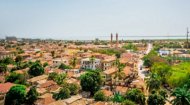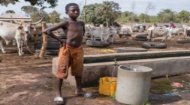|
Despite oil discoveries off its coast, Gambia is a poor country where the poverty rate remains at 48% while food insecurity has risen from 5% to 8% over the past few years as a result of weak food production systems and the effects of successive shocks such as drought and floods. Only around one sixth of Gambia's land is arable and poor soil quality effectively means its only main crop is peanuts and around 75% of Gambia's population depends on this crop together with rice, millet, sorghum, corn, sesame, cassava and palm kernels for subsistence consumption. Farmers also rear cattle sheep and goats for their livelihood. A nation depending on one main export is always vulnerable to international price fluctuations and as such, Gambia is heavily reliant on international aid. Unemployment and under employment rates in Gambia are also very high. The population of Gambia is 2.79 million (2025) with a life expectancy of around 63.83 years (2025). Access to education is also a major issue for children in the Gambia, for whilst secondary education is free, most secondary schools will not accept children who have not had a primary education, and that is not free and beyond the means of many Gambian families. This is reflected in its literacy rate, where the overall is around 58.67% however it is significantly lower for women than for men. The video gives a good look and feel of Gambia.
Banjul Profile
 A complete profile of Banjul, capital city of the Gambia, including Banjul information, facts, pictures and tourist attractions. More > | |











